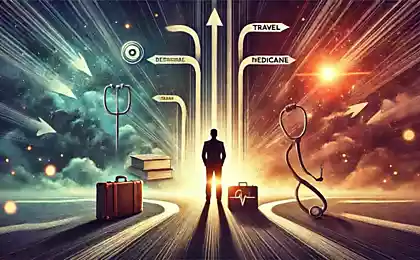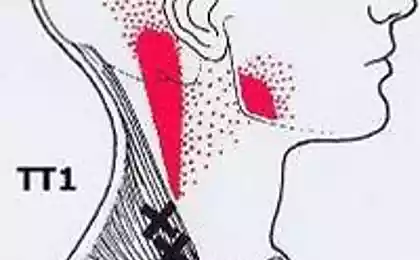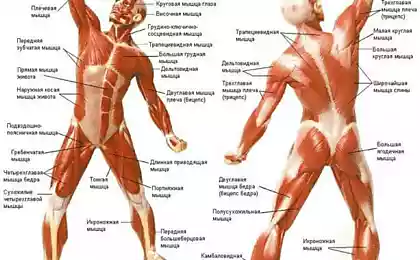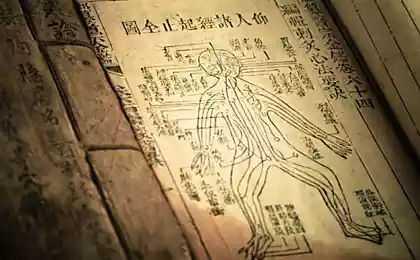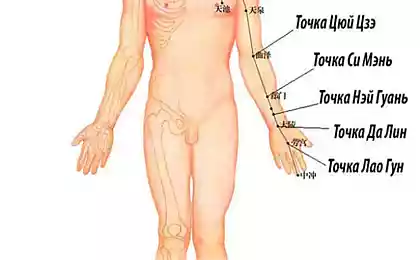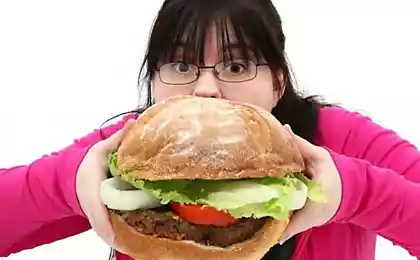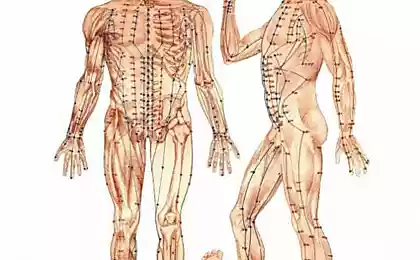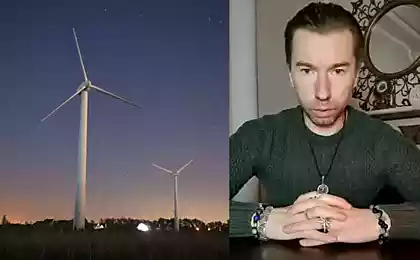492
The point of no return
No matter what we do, there's always that point where our actions become irreversible. The point of no return. The point at which there's no turning back.
To demonstrate this point of no return, I want to give an example of Dickensian "Posthumous notes of the Pickwick club".
One of the characters in these "notes" — Mr. Pickwick had a very impressive weight.
And here, once again, when Mr. Pickwick had to run, he stopped a cab on the street. Pikiwiki sat in the cab and only then noticed that the cabbie was also a man of very fat body, and the horse looked very neprezentabelen — it was a dead skinny nag.
Mr. Pickwick is surprised and asks the cabbie, "Excuse me, my dear, and this time we will take or not?"
To which the cabbie responds: "don't you worry, sir. The main thing — to force to take her first step, after that, the cab picks up speed, and the horse runs away from him so he didn't get run over".
That is what is the point of no return — it is necessary to take the first step, and then the events themselves will flow through the usual rut.

This case shows the law and of the human psyche — we should only have to do something, we'll come up with thousands of arguments justifying this event. And, therefore, will try this action to be developed further.
This basic principle of our emotional life — external circumstances or our habits urging us, like a heavy cart customize half-dead nag. Habits podparyvajut and guide our actions, and are for us to decide what we say and what we do in the future.
Thus begins the habit of Smoking, alcohol, overeating. Habits begin to control us, and not we habits.
And you need to learn to recognize these habits, and guide the development of events somewhat different way.
During any activity there is a moment (the point of no return), in which we can put events in a different scenario.
If this point is not a track to miss, the events will flow in the usual way.
But if the point is to see and to start her consciously observe, we can choose how we in this moment to do that.
In other words, any habit has its own algorithm. To get rid of this habit, you need this algorithm change.
And to change the minimum, but so that eventually the usual action is not implemented.
Let us consider the change of habits for example Smoking.
The usual sequence of actions that lead to Smoking is:
External cause (a night at the bar, drinking alcohol, defeat of Spartacus, fatigue and many others.more) > the Desire to smoke > he Took the pack in hand > smoke.
Key points in this algorithm two (two points of no return, the moment where we can affect the situation)
1. The desire to smoke.
2. He took a packet in his hand.
It is enough for us to act on any of these points. But let's consider only the second point — he Took a packet in his hand.
This sequence of actions we need to make an adjustment to the algorithm was the following:
External cause > Desire to smoke > he Took the pack in hand > SOMETHING > Solution (optional) NO Smoking.
Ie in the usual algorithm, we introduce an additional step (designated SOMETHING). This step should be easy, semi-automatic, but this step will eventually lead to a completely different result - the Decision NOT to smoke.

Psychotherapist V. Levi suggested as this extra step to do the following.
The person who wants to quit Smoking in advance is a list of reasons than Smoking personally, it is harmful: light spoils, spoils the color of the teeth, damages your skin, the smell of tobacco from his mouth and clothing, leads to heart attack, increases probability of cancer, etc.
This list of reasons he writes on a small paper.
Then buys the cigarette case on one side which paste this list of reasons. All purchased cigarettes shifts the pack in this case.
Then he set himself one small condition: "before you smoke a cigarette, I have to read the whole list."
A man who acts according to this scheme, every time you want to smoke and get the cigarette case reads the list and already consciously decide — "I will not smoke". And puts the cigarette case back in his pocket.
Ie, we are introduced to the usual algorithm of Smoking another interim action (read list), so the whole chain collapsed. The person stops Smoking.
Roughly the same can affect overeating (primarily evening).
For example, a woman walks in the evening after work home and walks into the store. She sees a rich selection of products — there is delicious, and flour, and fat.
And it was at this point she makes her choice — she estimates that of this variety to eat. And if she buys something, then later events are on the usual scenario — without any compunction and much thought, all she eats is purchased sitting at home in front of the TV.
In my course "Weight loss" we also inadvertently will learn to track these points:
— the desire to eat something delicious;
— to change the usual algorithm", see > ate".
Working with these two points of no return is purely psychological methods and allows us to achieve excellent results in weight loss.
Willpower when it is not needed, but rather harmful.
For example, it is clear that you can not afford an effort to prevent the desire to eat something delicious. The desire is either there or not there.
And our task is not to suppress a powerful strong-willed effort is the desire and make it so that it simply did not occur.
Perhaps it seems fantastic... Seems like you can make a man who loves sweets, he, without coercion ceased to love them...
Meanwhile, modern psychology allows by simple tasks to solve this problem.
Same is the case with exercise. The hardest part of strength training not squat with a barbell weighing 250 kg on his shoulders.
For most athletes involved in power sports, the most difficult is to start packing your bag to go to the gym. Because, after the athlete began to stow the bag, no further action flow usual scenario and did not cause such a protest, as the first most important work of laying the bags.
The same rule applies to any type of activity.
3 reasons why you're NOT richdon't take ANYTHING from the losers!
If we want to be successful, we need to learn to track these critical points, and that they slightly modify the usual algorithm. Then we will be able easily to change their habits.published
P. S. And remember, only by changing their consumption — together we change the world! ©
Source: www.faleev.com/slimming/slim/p038.html
To demonstrate this point of no return, I want to give an example of Dickensian "Posthumous notes of the Pickwick club".
One of the characters in these "notes" — Mr. Pickwick had a very impressive weight.
And here, once again, when Mr. Pickwick had to run, he stopped a cab on the street. Pikiwiki sat in the cab and only then noticed that the cabbie was also a man of very fat body, and the horse looked very neprezentabelen — it was a dead skinny nag.
Mr. Pickwick is surprised and asks the cabbie, "Excuse me, my dear, and this time we will take or not?"
To which the cabbie responds: "don't you worry, sir. The main thing — to force to take her first step, after that, the cab picks up speed, and the horse runs away from him so he didn't get run over".
That is what is the point of no return — it is necessary to take the first step, and then the events themselves will flow through the usual rut.

This case shows the law and of the human psyche — we should only have to do something, we'll come up with thousands of arguments justifying this event. And, therefore, will try this action to be developed further.
This basic principle of our emotional life — external circumstances or our habits urging us, like a heavy cart customize half-dead nag. Habits podparyvajut and guide our actions, and are for us to decide what we say and what we do in the future.
Thus begins the habit of Smoking, alcohol, overeating. Habits begin to control us, and not we habits.
And you need to learn to recognize these habits, and guide the development of events somewhat different way.
During any activity there is a moment (the point of no return), in which we can put events in a different scenario.
If this point is not a track to miss, the events will flow in the usual way.
But if the point is to see and to start her consciously observe, we can choose how we in this moment to do that.
In other words, any habit has its own algorithm. To get rid of this habit, you need this algorithm change.
And to change the minimum, but so that eventually the usual action is not implemented.
Let us consider the change of habits for example Smoking.
The usual sequence of actions that lead to Smoking is:
External cause (a night at the bar, drinking alcohol, defeat of Spartacus, fatigue and many others.more) > the Desire to smoke > he Took the pack in hand > smoke.
Key points in this algorithm two (two points of no return, the moment where we can affect the situation)
1. The desire to smoke.
2. He took a packet in his hand.
It is enough for us to act on any of these points. But let's consider only the second point — he Took a packet in his hand.
This sequence of actions we need to make an adjustment to the algorithm was the following:
External cause > Desire to smoke > he Took the pack in hand > SOMETHING > Solution (optional) NO Smoking.
Ie in the usual algorithm, we introduce an additional step (designated SOMETHING). This step should be easy, semi-automatic, but this step will eventually lead to a completely different result - the Decision NOT to smoke.

Psychotherapist V. Levi suggested as this extra step to do the following.
The person who wants to quit Smoking in advance is a list of reasons than Smoking personally, it is harmful: light spoils, spoils the color of the teeth, damages your skin, the smell of tobacco from his mouth and clothing, leads to heart attack, increases probability of cancer, etc.
This list of reasons he writes on a small paper.
Then buys the cigarette case on one side which paste this list of reasons. All purchased cigarettes shifts the pack in this case.
Then he set himself one small condition: "before you smoke a cigarette, I have to read the whole list."
A man who acts according to this scheme, every time you want to smoke and get the cigarette case reads the list and already consciously decide — "I will not smoke". And puts the cigarette case back in his pocket.
Ie, we are introduced to the usual algorithm of Smoking another interim action (read list), so the whole chain collapsed. The person stops Smoking.
Roughly the same can affect overeating (primarily evening).
For example, a woman walks in the evening after work home and walks into the store. She sees a rich selection of products — there is delicious, and flour, and fat.
And it was at this point she makes her choice — she estimates that of this variety to eat. And if she buys something, then later events are on the usual scenario — without any compunction and much thought, all she eats is purchased sitting at home in front of the TV.
In my course "Weight loss" we also inadvertently will learn to track these points:
— the desire to eat something delicious;
— to change the usual algorithm", see > ate".
Working with these two points of no return is purely psychological methods and allows us to achieve excellent results in weight loss.
Willpower when it is not needed, but rather harmful.
For example, it is clear that you can not afford an effort to prevent the desire to eat something delicious. The desire is either there or not there.
And our task is not to suppress a powerful strong-willed effort is the desire and make it so that it simply did not occur.
Perhaps it seems fantastic... Seems like you can make a man who loves sweets, he, without coercion ceased to love them...
Meanwhile, modern psychology allows by simple tasks to solve this problem.
Same is the case with exercise. The hardest part of strength training not squat with a barbell weighing 250 kg on his shoulders.
For most athletes involved in power sports, the most difficult is to start packing your bag to go to the gym. Because, after the athlete began to stow the bag, no further action flow usual scenario and did not cause such a protest, as the first most important work of laying the bags.
The same rule applies to any type of activity.
3 reasons why you're NOT richdon't take ANYTHING from the losers!
If we want to be successful, we need to learn to track these critical points, and that they slightly modify the usual algorithm. Then we will be able easily to change their habits.published
P. S. And remember, only by changing their consumption — together we change the world! ©
Source: www.faleev.com/slimming/slim/p038.html
